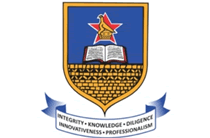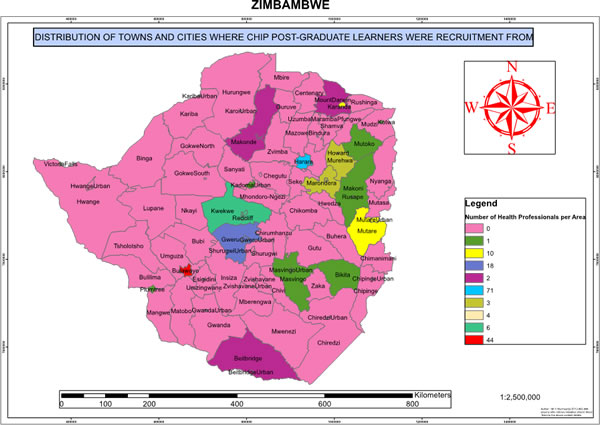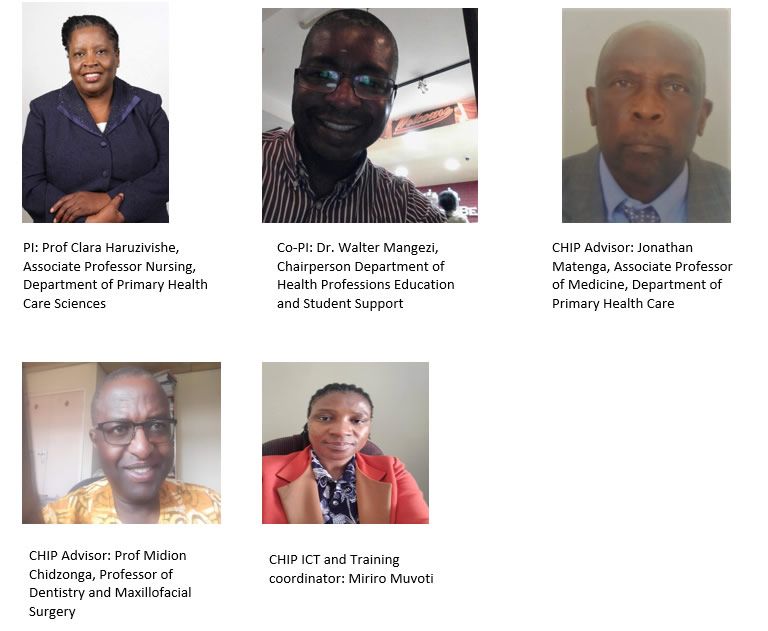 KEY PERSONNEL: Dr. Clara Haruzivishe (PI), Dr. Walter Mangezi (Co-PI), Dr. Jonathan Matenga (Project Advisor), Dr Midion Chidzonga (Project Advisor), Miriro Muvoti (Training Coordinator)
KEY PERSONNEL: Dr. Clara Haruzivishe (PI), Dr. Walter Mangezi (Co-PI), Dr. Jonathan Matenga (Project Advisor), Dr Midion Chidzonga (Project Advisor), Miriro Muvoti (Training Coordinator)
PROJECT TITLE: Collaborative HIV Interprofessional Partnership Program (CHIP)
PROJECT YEAR 1 RECAP:
The University of Zimbabwe Faculty of Medicine and Health Sciences, (UZFMHS) successfully implemented CHIP 1 (2019-2020), training 20 faculty members, 15 health workers, and 276 preservice health workers at 5 training sites.
PROJECT YEAR 2 SUMMARY:
In CHIP 2, the project expanded training to 331 pre-service health professionals and 191 working health professionals across 39 institutions and clinical sites. Most pre-service learners took the STRIPE HIV Online Course, while all post-graduate learners and some pre-service learners participated in STRIPE HIV Virtual Workshops.
For the Online Course, there was a course introductory session at the beginning of the week after which learners went through the self-paced activities during the course of the week. At the end of the week, there was a module wrap-up Zoom session where synchronous group activities were done, and the facilitator concluded the module. For the STRIPE Virtual Workshop, learners were encouraged to do the pre-knowledge quizes at the beginning of the week. Each module was covered in a single facilitator-led Zoom session after which the learners would then do the post knowledge quizzes on the LMS. Training cohorts ran from 7 June-30 August 2021 and 16 August-16 September 2021.
MAIN ACCOMPLISHMENTS:
- The project team recruited 12 facilitators from UZFMHS who attended the webinar trainings and Training of Trainers sessions conducted by AFREhealth-UCSF. These facilitators were oriented by CHIP leadership on how they should conduct STRIPE sessions, and they also received training materials which they utilised to deliver the virtual sessions online.
- CHIP trained 331 pre-service health professionals, exceeding their training target of 310. Evaluation results show that 80% of the pre-service participants were confident to apply the skills and knowledge they acquired from the training.
- CHIP trained 191 post-graduate professionals, meeting their training target of 190. Evaluation results show that 92% of these participants were confident to apply the skills and knowledge they acquired from the training.
- CHIP also exceeded training targets for the additional modules on COVID-19 and teamwork and collaboration, training more than 70 pre-service and 100 post-graduate learners on each of these modules (targets were 40 and 50, respectively). A great majority of the learners (82% for the COVID-19 module and 88% for the teamwork and collaboration module) rated the training very effective and indicated they were confident to implement the skills and knowledge covered in the modules.
- CHIP met nearly 400% of its training reach target (10 sites), training working health professionals at 38 academic, government and clinical sites.
CHALLENGES AND SOLUTIONS
- Data challenges can be minimized by reimbursing data costs: It was found to be more effective for learner retention and appropriate use of data to reimburse learners for data costs after they attended all sessions, completed the post-course evaluation survey, and downloaded their certificate of completion.
- Risk of learners missing critical communication and lagging in their learning: The project employed multiple means of communication including emails, text messages, WhatsApp messages, and in some cases, calling individual learners. Despite all this, there were learners who missed some critical communication. Causes ranged from poor network in their areas, messages not delivering on time, calls not getting through, and not seeing emails on time.
- eLearning Etiquette: Learners in general should be given lessons on eLearning etiquette, for example minimizing background noise during Zoom sessions, joining late, muting mic when not talking, and joining discussion breakout rooms timely. These practices were encouraged during workshops to limit disruption to learning.
- Leadership and governance for successful eLearning implementation: Overall successful eLearning should be a nationwide endeavor where responsible authorities ensure the nation has reliable infrastructure for connectivity even in the most remote areas. Service providers should also be able to make data affordable through the right support from national leaders.
TRAINING PARTNERS
- Midland State University Faculty of Medicine
- National Institution of Science and Technology Faculty of Medicine
PARTICIPATING CINICAL SITES
Working health professionals joined the training from 31 health facilities (27 of which receive PEPFAR support, indicated by a * below), in addition to 7 academic and government sites that employ health professionals (Figure 1).
- AIDS Healthcare Foundation, Mpilo Central Hospital*
- Beitbridge District Hospital*
- Chinhoyi Provincial Hospital*
- Chitungwiza Central Hospital*
- Chivhu General Hospital*
- City of Harare
- City of Mutare
- Esigodini Hospital*
- Filabusi District Hospital OIC*
- Howard Hospital*
- Ingutsheni General Hospital*
- Kadoma City - Dept of Personal Health
- Karanda Mission Hospital*
- Kotwa District Hosp*
- Marondera Provincial Hospital*
- Michael Gelfand ER24
- Ministry of Health & Child Care
- Mpilo Central Hospital*
- Nketa Clinic, Bulawayo*
- Old Mutare Mission Hospital*
- OPHID*
- Parirenyatwa Central Hospital*
- Plumtree District Hospital*
- Premier Service Medical Investments Kwekwe
- Premier Service Medical Investments- Harare
- Rusape General Hospital*
- Sadza District Hospital*
- Sakubva Maternity, City Health*
- Sally Mugabe Central Hospital*
- United Bulawayo Hospitals*
- University of Zimbabwe Faculty of Medicine and Health Sciences*
- UZ-CTRC
- Victoria Falls Hospital*
- Waterfalls Satelite Clinic*
- West End Hospital
- Wilkins Hospital*
- Women University in Africa
- Zimbabwe Open University
Figure 1. Map showing areas from where participants were recruited.

IMPLEMENTATION
- Training cohorts: 2
- Facilitators: 12
|
Profession |
Experience |
Gender |
Teaching Experience |
||||
|
Medical |
5 |
0-5 years |
Male |
4 |
HIV educator |
11 |
|
|
Nursing/Midwifery |
4 |
6-10 years |
1 |
Female |
8 |
Non-HIV educator |
1 |
|
Pharmacy |
1 |
> 11 years |
11 |
Other |
|||
|
Laboratory |
0 |
|
|
||||
|
Other |
2 |
|
|
||||
- Learners:
|
Medical |
Nursing/ Midwifery |
Pharmacy |
Laboratory |
Other |
Total |
|
|
Pre-service |
114 |
85 |
74 |
5 |
53 |
331 |
|
Post-graduate < 12 months |
10 |
9 |
15 |
0 |
8 |
42 |
|
Post-graduate > 12 months |
44 |
46 |
20 |
5 |
34 |
149 |
|
TOTAL |
168 |
140 |
109 |
10 |
95 |
522 |
|
Gender |
|
|
Male |
219 |
|
Female |
303 |
|
TOTAL |
522 |
INNOVATING HIV TRAINING DURING COVID-19: The transition to online learning enabled participation by health workers that could not have been easily reached with in-person training.
BROADER IMPACT:
After participating in STRIPE HIV Year 2, UZFMHS is adapting its implementation of the HEPI grant PETRA* to integrate IPE and develop online modules (a five-year grant ending in 2023, awarded under the leadership of the late Prof James Hakim). These modules will be delivered in a similar fashion that the CHIP 2 project was delivered in Zimbabwe. They will use the three faculty members that participated in the Prof James Hakim Leadership Development Program to facilitate the PETRA Advanced IPE Leadership Course.
Interest is being shown by private sector partners to provide STRIPE training annually to medical and pharmacy health professionals for a fee. Participants would receive credit hours.
Health professionals employed by the Ministry of Health & Child Care (MOHCC) have participated in STRIPE training and provided positive feedback. With MOHCC buy-in, CHIP would like to integrate STRIPE training into the National HIV Programme.
IMPACT VIGNETTES
- The transitioning of STRIPE online / virtual learning came at a “teachable “moment when the institution was embarking on online teaching. Leaders and educators welcomed the free training and experience that came as a package. Their enthusiasm generated eagerness to learn within the preservice and working professionals who are the recipients of this innovative way of teaching. – Program team member
- Transitioning to virtual learning has saved me traveling time because I don’t have to drive to campus. This has allowed me to fit more into my day and assist with the roll out of more modules that I would have otherwise. In addition, I can be available to assist my children with homeschooling and immediately start training. – Facilitator
- The STRIPE virtual learning has made a very positive impact in my nursing career. I now know how to handle patients and relatives in the ART program. My biggest highlight was an eye opener to deal and learn how to address key populations. – Learner
- I think going virtual has made STRIPE easier and less costly to attend. We can now attend from wherever we are without the need to travel. This is convenient especially in the current COVID-19 environment. However, this has removed the personal physical interaction, now having to do faceless interactions. But overall, the virtual learning is the way to go. – Learner
CHIP TEAM








